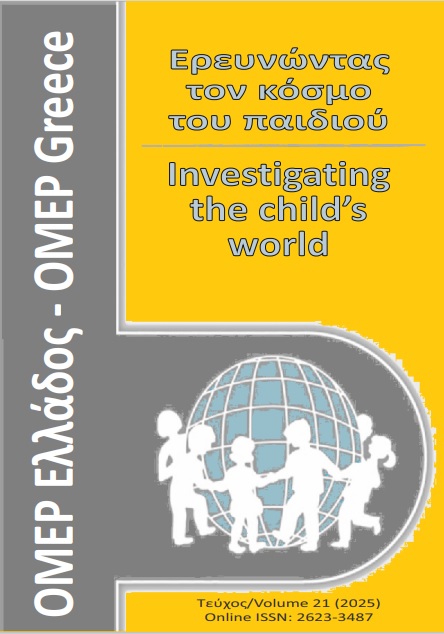Διερεύνηση αντιλήψεων εκπαιδευτικών Πρωτοβάθμιας Εκπαίδευσης σχετικά με την Ψυχική Ανθεκτικότητα των ίδιων και των μαθητών/τριών τους
Abstract
This paper aims to investigate the opinions of primary school teachers of Heraklion regarding resilience of both their students and themselves. Firstly, the theoretical framework regarding resilience as a concept is in detail presented, along with its association with educators in a school context. Also, special reference to the resilience of the teachers themselves is made. Then, the methodological design and the basic research questions answered through the interviews, are mentioned. 13 primary school teachers participated in these unstructured interviews, through which both teachers' knowledge about resilience and the perceptions they have about the factors shaping it were shown. Special reference was made to the role of the school and the family, as well as to their resilience in the Greek school of today. The data from the interviews were analyzed, categorized and presented in this paper in relation to pre-existing literature. In this research we aimed to investigate teachers’ knowledge about resilience and their perceptions about this topic not to mention the role of school in the resilience process. Though data analysis one can conclude that teachers who participated have basic theoretical background and specific perceptions and proposals for the empowerment of resilience.
Article Details
- How to Cite
-
ΜΠΕΡΤΣΙΑ Β., & Poulou, M. (2025). Διερεύνηση αντιλήψεων εκπαιδευτικών Πρωτοβάθμιας Εκπαίδευσης σχετικά με την Ψυχική Ανθεκτικότητα των ίδιων και των μαθητών/τριών τους. Investigating the child’s World, 21, 59–72. Retrieved from https://ejournals.epublishing.ekt.gr/index.php/omep/article/view/34380
- Issue
- Vol. 21 (2025)
- Section
- Scientific articles & educational projects

This work is licensed under a Creative Commons Attribution-NonCommercial 4.0 International License.
Authors who publish with this journal agree to the following terms:
· Authors retain copyright and grant the journal right of first publication with the work simultaneously licensed under a Creative Commons Attribution Non-Commercial License that allows others to share the work with an acknowledgement of the work's authorship and initial publication in this journal.
· Authors are able to enter into separate, additional contractual arrangements for the non-exclusive distribution of the journal's published version of the work (e.g. post it to an institutional repository or publish it in a book), with an acknowledgement of its initial publication in this journal.
· Authors are permitted and encouraged to post their work online (preferably in institutional repositories or on their website) prior to and during the submission process, as it can lead to productive exchanges, as well as earlier and greater citation of published work.



